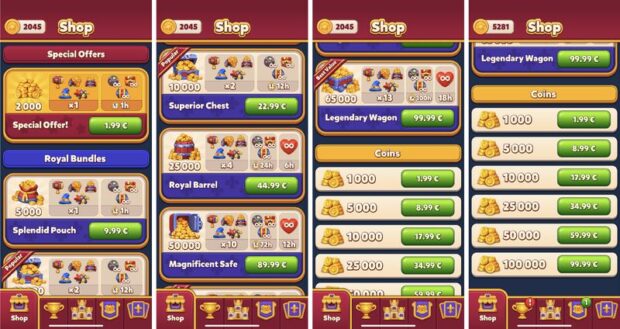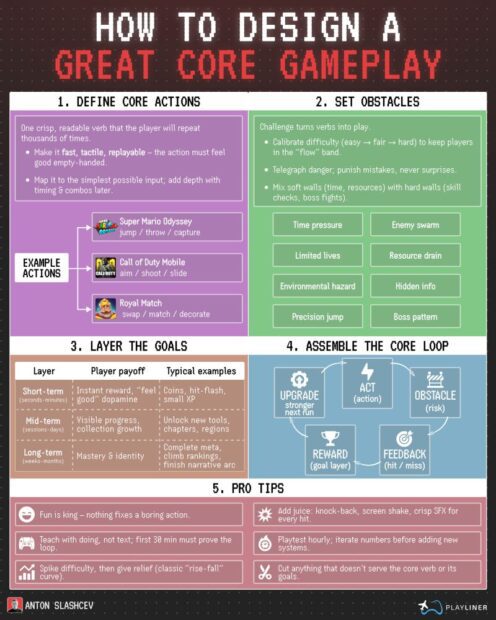
Royal Kingdom’s Hollywood Power Play: Last Hurrah or Royal Rebirth?
AnalysisHighlightsJournal 588 Ahmetcan Demirel April 21
Launching a new Match-3 game in today’s mobile market is like trying to sell umbrellas in the Sahara as we discussed in a recent article. Saturation, soaring CPIs, and razor-thin differentiation margins make even the most technically sound games struggle to scale. When Dream Games soft launched Royal Kingdom two years ago, they entered this same storm, which quickly showed itself.
The game was anything but static. It went through long stretches of silence (including a six-month update drought), only to emerge with radical changes, including a full hard reset over a year into its soft launch. But if the product evolution wasn’t enough of a rollercoaster, Dream just took things to a whole new altitude.
In what may be the boldest marketing swing the mobile gaming industry has ever seen, Royal Kingdom has gone full celebrity mode. LeBron James, Jimmy Fallon, Kevin Hart, Shakira, each with their own unique (and surprisingly entertaining) ad segments, have turned the game’s YouTube page into a veritable red carpet showcase. These aren’t your average “celebs awkwardly tapping a screen” spots either. The videos have polish, humor, and ambition.
One thing is clear: Dream didn’t just dabble in celebrity marketing. They went all in, pouring millions into the production of these videos, with tens of millions more likely earmarked for distribution across every imaginable channel.
Watching Royal Kingdom’s evolution over the years through pivots, resets, and reinventions, and now seeing the sheer scale of this campaign, a single question comes to mind: Is this the final blaze of glory before the game goes up in flames, or the opening act of a new Match-3 powerhouse that finally brings Dream’s long-dreamt Royal IP to life?
Act I: A Kingdom Built on Bold Ambitions
Given how many twists and turns this game has taken, a brief retrospective on Royal Kingdom’s journey feels long overdue. Dream’s attempt to build Royal Kingdom was rooted in what felt like a natural strategic expansion. With Royal Match dominating the casual Match-3 charts, Royal Kingdom aimed to stretch Dream’s reach further: pulling in players who wanted something with a bit more bite.
If this were ten years ago, Royal Kingdom would likely have been an instant hit with King Richard standing toe-to-toe with his older brother, King Robert. Back then, UA (User Acquisition) costs were manageable, and the Match-3 space still had plenty of room for newcomers. But today, that same space has become one of the reddest oceans in mobile gaming. And in a market this competitive, survival depends on offering something that’s not just good, but truly different.
And to their credit, Dream didn’t just reskin their golden goose. The original Royal Kingdom offered real differentiation:
- PvP-style “attack levels” that let players assault each other’s castles, channeling vibes from Social Casino games.
- Player XP and leveling systems tied directly into gameplay, not just meta fluff.
- A win streak mechanic that literally doubled metagame currency, rewarding skill and engagement.
These weren’t half-measures. The game rewarded mastery, encouraged grinding, and built on Dream’s unmatched switcher engine. It was a midcore twist inside a casual wrapper. A risky, ambitious blend.

But ambition alone isn’t enough. While this v1 had innovation on paper, it didn’t convert into performance. The game didn’t bomb entirely, but returns were far below the expectations for a company that’s home to one of the top-grossing mobile titles of all time. The audience wasn’t as wide as Dream had hoped. The dream of expanding their total reach started to look more like a niche experiment.
Act II: Resetting the Crown
When the first iteration failed to deliver, Dream did something most companies wouldn’t dare. They hit full brakes. No updates for six months, then a full-scale hard reset. But they didn’t nuke everything. The core gameplay (the switching engine, level items, and overall level design) remained completely intact. In other words, the moment-to-moment experience was never the issue.
And honestly, it would’ve been shocking if it was. Dream already delivers what’s arguably the best core gameplay in the entire Match-3 market. That part was always expected to hold up. What changed, instead, was everything wrapped around that core. The systems, the structure, the progression… All the layers that shape how players engage beyond the board.
Gone were the PvP attack levels straight from Social Casino games. Instead, players now battled a generic villain, the “Dark King,” through PvE “Kingdom Levels”. The distinct XP system was simplified into basic player stats just like any other puzzle game on the market. And the metagame rewards normalized across the player base, ceasing to reward the more skillful players.

In effect, Dream stripped Royal Kingdom of the very features that had made it stand out by replacing them with mechanics more aligned to its older brother, Royal Match. The team probably saw that those changes boxed the game to a very niche market. The game became more familiar, less risky, more digestible for the broader audience after the reset.
In fact, the core gameplay experience was even improved with the addition of a few smartly designed obstacles and subtle mechanic tweaks that you can read about here. But at its heart, it was still very much about the core gameplay itself. Polished, responsive, and already best-in-class. It was a bet that maybe innovation was the wrong path, and imitation (with minor twists) might prove safer.
Act III: Lights, Camera, Celebrity
For months, things were quiet. No major updates. No pivots. No big news. To be honest, there’s even no real v3. Royal Kingdom hasn’t seen any major updates since the hard reset. Sure, there were some visually polished events, including one clearly inspired by Block Blast, but nothing substantial enough to warrant a full write-up.
That’s why, even when the game’s daily installs spiked more than 20x in just two days last November, I held off. There simply wasn’t much to say from a product or design standpoint. But now, with Dream launching what might be the most expensive celebrity-driven campaign the games industry has ever seen, it felt like time to revisit the game. This time, from a different angle.
So why now? Why pour this kind of money into a game that’s already stumbled multiple times and struggled to find its footing? What makes Royal Kingdom worth this kind of bet?
First, they can afford it. With a war chest few can rival, Dream has the financial muscle to run massive campaigns without flinching. More importantly, they’re still looking to raise even more capital. This campaign could double as a flex for investors as much as for players.
The second reason comes down to portfolio management. As a single-game company, Dream never had to worry about cannibalization, about one game eating into the player base or revenue of another. That freedom likely played a big role in how Royal Kingdom was originally conceived. The goal wasn’t to compete with Royal Match, but to expand the overall reach. By targeting a slightly different audience with a more midcore-flavored experience, Royal Kingdom could complement the portfolio rather than conflict with it. That made the investment feel justified. A differentiated product meant lower risk of overlap, and higher potential for net-new players.
But now that the two games look and feel so similar, Dream may have a bigger problem on its hands. The challenge is no longer about expanding reach, it’s about making sure the combined revenue from both games actually exceeds what Royal Match could deliver on its own. The risk? Royal Kingdom could end up being a weaker performer in terms of LTV. And in a genre where payback periods can stretch up to two years, it’s not something you’ll see in the short term. Just ask miHoYo. Launching a visually stunning, massive game doesn’t always translate into meaningful gains at the portfolio level. What began as a diversification play may now be veering into cannibalization territory.

Still, Dream isn’t naive. They understand that scaling a Match-3 in today’s climate is brutally expensive. Players today are spoiled for choice with some of the highest quality gameplay and LiveOps management spread across multiple titles. Incumbents hold a massive advantage in this high-CPI environment. They’ve already secured their foothold and know exactly how to retain their top players.
Being one of those incumbents, Dream knows better than most that standing out requires more than product polish. It requires spectacle. And sometimes, it also takes something bold. Maybe even a little crazy.
And this marketing blitz? It’s pure spectacle. It just might be that wild card the game needed. By going ultra top-of-funnel with A-list stars, they’re not just trying to grab installs. They’re making a cultural play. They’re aiming to position Royal Kingdom not just as a game, but as entertainment.
While Dream will undoubtedly continue leaning on traditional mobile UA to scale Royal Kingdom and drive installs, this ultra top-of-funnel strategy could be the thing that tips the balance in their favor. That is if driving installs is even the goal anymore, given the portfolio management considerations we talked about earlier…
What’s the Endgame?
As you can see, there’s no shortage of speculation. About how much this campaign cost, what Dream hopes to achieve with it, and why now. But if you’re expecting clear answers, don’t hold your breath. They aren’t exactly known for transparency or sharing much about their strategic thinking.
With all this in motion, there’s still one uncomfortable truth: the game itself hasn’t changed since the hard reset. It looks and plays much like it did a year ago, just now with celebrity flair. Sure, making Royal Kingdom more similar to Royal Match may have helped. But on its own, that move runs counter to both current market dynamics and Dream’s unique position. In today’s landscape, simply cloning Royal Match with a few new characters and lightly tweaked metagames isn’t enough. Not when players expect more.
So, is that it? Was a huge marketing campaign all that the game needed? I think this isn’t about creating a new mega-hit. It’s about building the Royal IP and giving players a vacation home.

Players “taking a vacation” is a point that pops up every now and then on the TWIG podcast, which I agree with. Especially in long-running live games, player fatigue is real. Big spenders sometimes take breaks, hopping into other games before circling back. And if those vacation games offer a solid experience, they can become part of a long-term routine: players continue investing most of their time and money into their primary title, while still dropping some pocket change into the side games that caught their attention.
Royal Kingdom, with its familiar-but-fresh feel, might be the ideal “vacation game” for lapsed or burned-out Royal Match players. It offers:
- The same best-in-class switcher engine, but with slightly more challenge and some new features.
- A familiar experience with the layout and structure mirroring Royal Match.
- A way to reignite the spark for players who once loved Royal Match but eventually churned out.
Of course, all of this is speculation. Royal Kingdom could still defy expectations and become the next breakout Match-3 hit. Especially with Hollywood and the NBA now in its corner.
But for Dream, even if the game doesn’t rival Royal Match, it doesn’t have to. If Royal Kingdom can extend the lifetime of their most valuable players, even by a few months, it pays off. If it brings back some churned spenders? Even better. In the end, maybe Royal Kingdom isn’t meant to usurp the throne. Maybe it’s Robin to Royal Match’s Batman, the understudy that ensures the show always goes on…







